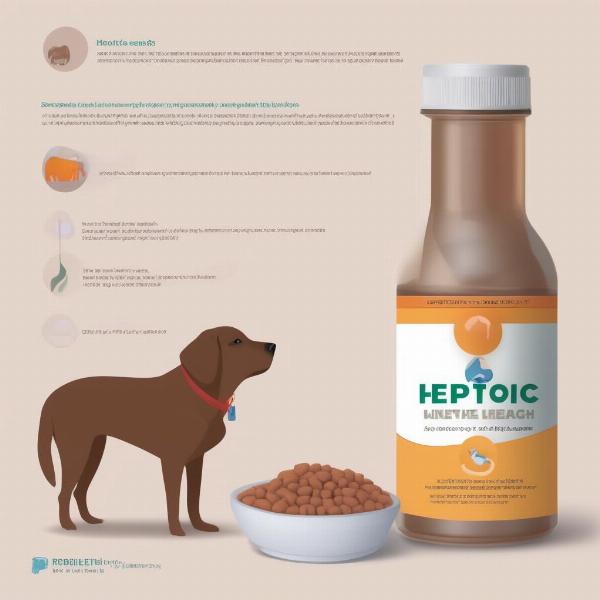Heptonic for dogs is a topic that often sparks curiosity and concern among pet owners. Understanding the potential benefits and risks associated with this supplement is crucial for making informed decisions about your dog’s health. This guide delves into the key aspects of heptonic for dogs, providing valuable insights into its uses, potential side effects, and important considerations.
Understanding Heptonic and Its Uses in Dogs
Heptonic is often marketed as a general health tonic for dogs, claiming to support liver function, boost appetite, and improve overall well-being. While some anecdotal evidence suggests potential benefits, it’s essential to approach these claims with a critical eye. Always consult with your veterinarian before giving your dog any new supplements, including heptonic. They can assess your dog’s individual needs and determine if heptonic is appropriate. Many factors can influence a dog’s health, and a comprehensive veterinary examination is crucial for accurate diagnosis and treatment.
 Heptonic for Dogs: Liver Support
Heptonic for Dogs: Liver Support
Potential Benefits and Risks of Heptonic for Dogs
While research on the specific effects of heptonic in dogs is limited, some of its ingredients have known benefits. For instance, B vitamins are essential for various bodily functions, including energy production and nerve health. However, it’s important to note that most commercial dog foods already contain adequate amounts of these vitamins. Therefore, supplementing with heptonic might not be necessary and could even lead to vitamin imbalances if given in excess.
One potential risk associated with heptonic is the presence of certain ingredients that could be harmful to dogs with specific health conditions. For example, some formulations contain xylitol, an artificial sweetener that is toxic to dogs. Always check the ingredient list carefully and consult your vet before giving heptonic to your dog.
Consulting Your Veterinarian: The First Step
Before considering heptonic or any other supplement for your dog, it’s crucial to consult with your veterinarian. They can assess your dog’s health, discuss any underlying conditions, and advise on the appropriate course of action. Providing your vet with a complete history of your dog’s diet, exercise, and any observed symptoms will help them make informed recommendations. Remember, what works for one dog might not be suitable for another.
Choosing the Right Heptonic Product (If Recommended by Your Vet)
If your veterinarian determines that heptonic could be beneficial for your dog, they can guide you in choosing a reputable product. Look for products with clear labeling, a complete list of ingredients, and manufacturing information. Avoid products with vague claims or those that lack proper quality control measures.
Conclusion
Heptonic for dogs might offer some potential benefits, but it’s essential to approach its use with caution. Always prioritize consulting your veterinarian before giving your dog any new supplements. They can assess your dog’s individual needs and determine if heptonic is appropriate. By working closely with your vet and making informed decisions, you can ensure your furry friend receives the best possible care.
FAQ
- Is heptonic safe for all dogs? Not necessarily. Some dogs may have sensitivities to certain ingredients, and underlying health conditions can also influence how a dog reacts to heptonic. Always consult your vet.
- What are the signs of an adverse reaction to heptonic? Potential side effects include vomiting, diarrhea, lethargy, and loss of appetite. If you notice any of these signs, stop giving heptonic and contact your vet immediately.
- Can I give my dog heptonic along with other medications? It’s important to discuss this with your vet as heptonic could interact with certain medications.
- Where can I buy heptonic for my dog? Heptonic can often be found in pet stores and online retailers. However, always choose reputable sources and products recommended by your veterinarian.
- Are there any natural alternatives to heptonic? Depending on the reason you’re considering heptonic, there might be natural alternatives. Discuss options with your vet.
About ILM Dog
ILM Dog is your trusted resource for all things canine, providing expert guidance on dog breeds, health, training, nutrition, grooming, and more. We offer comprehensive advice to help you provide the best possible care for your furry friend. We specialize in dog breed selection, health & medical care, training & behavior, nutrition & feeding, and products & accessories. For personalized guidance, contact us via email at [email protected] or by phone at +44 20-3965-8624.